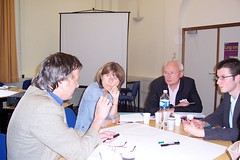Brussels, 6 June. Following the challenging development commitments in 2005, several Member States and the European Commission are putting their efforts together to launch an annual of ambitious development reports, to strengthen the linkages of the development research with policymaking. During the R4D session facilitated by EADI, Françoise Moreau, DG Development, presented the European development report. The following entry is a comment by Can Akdeniz, EADI.
Anyone taking a closer look at the existing development research sector (including or as part of international and area studies) in Europe would surely conclude that there is a large and high-quality intellectual capacity on development issues covering almost all areas, topics and disciplines. At the heart of this capacity are the institutes of development studies, development research centres and think-tanks. They are producing academic and applied research, policy analysis and advice of very diverse character. More than 150 of these institutes in 28 countries of Europe and employing more than 3000 academics and researchers are members of the European Association of Development Research and Training Institutes, EADI.
However, there have been no real incentives for European development researchers to develop more international co-operative research projects at the European level to date. Such efforts should aim at developing a joint pan-European capacity on global development issues and Europe’s role in the world. Furthermore, no sufficient frameworks exist within which one could work out how research in Europe could be translated into better European policy and practice. Up until now it was left to national development agencies, universities and research councils to provide continuous support to the development research capacity in Europe. This support has more or less reflected the local needs of national constituencies i.e. bilateral donors rather than European needs in research, analysis and advice.
Policies of research donors in Europe
At the same time bilateral agencies that have paid special attention to development research have chosen to do so by supporting national capacities and sometimes Southern research capacities. Strengthened research capacities in the South have an effect on target group commitment, uptake capacity and national innovation systems, thus improving the impact of research by enhancing the uptake and application of research results.
However, the strong focus on strengthening Southern research capacities has left something of a gap in the whole picture, especially concerning the question: How to best improve the impact and utilise research produced in Europe in Southern contexts? At the same time, many bilateral agencies are supporting their national development research communities (institutes, universities or networks) to meet their specific knowledge needs in international affairs and development issues. We could easily quote and list many such examples in Europe. It seems that local needs are unlikely to disappear. Some bilateral agencies are already making efforts to improve the impact of the research funded by themselves. DFID’s research4development (http://www.research4development.info/) portal is one example.
Bridging the gap
In December 2005, the European Union (EU) published its new development policy the European Consensus on Development”, signed by the European Commission, Council, Parliament and the 25 member states. The European Consensus is ambitious as it puts forward a unified EU strategy. Principles and values for international development are formulated for the bilateral policy of both the Commission and member states. The European Consensus on Development, therefore, highlights the need to stimulate the debate on development in Europe, to enhance analytical capacity at European level and to strengthen the linkages with policy making.
These concepts are further refined in the Commission Communication "EU Aid: delivering more, better and faster" which proposes a European initiative aiming at enhancing the European vision on development and its influence in the international development agenda. At the EADI General Conference in 2005, the European Commissioner Louis Michel committed himself to finding ways of strengthening the contribution of the EU development research community to EU development policy. Discussions since then have crystallized around the idea of European Development Report, annual research-led review of development issues and a European counterpart to other major flagship global reports.
Story by Can Akdeniz, EADI


No comments:
Post a Comment